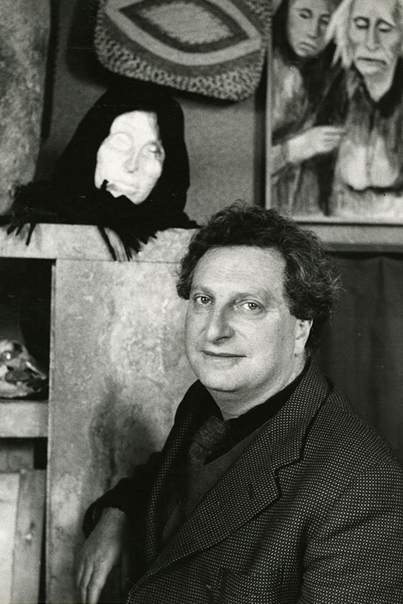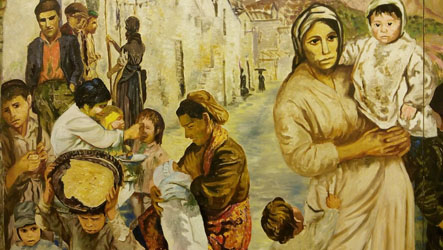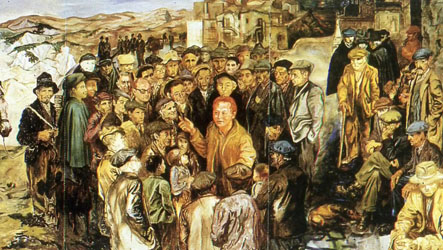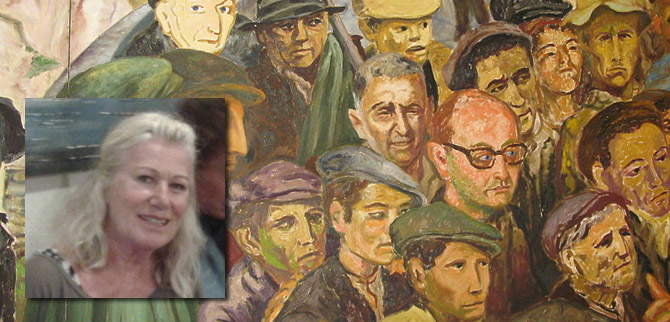Every age has its own Fascism– some thoughts about the artist and writer Carlo Levi
by Dr Greta Sykes
Poet, writer and artist Greta Sykes has published her work in many anthologies. She is a member of London Voices Poetry Group and also produces art work for them. Her new volume of poetry called ‘The Shipping News and Other Poems’ came out in August 2016. The German translation of her book ‘Under charred skies’ has now been published in Germany under the title ‘Unter verbranntem Himmel’ by Eulenspiegel Verlag. She is the chair of the Socialist History Society and has organised joint poetry events for them at the Poetry Café. She is a trained child psychologist and has taught at the Institute of Education, London University, where she is now an associate researcher. Her particular focus is now on women’s emancipation and antiquity. Twitter: @g4gaia. Facebook.com/greta.sykes. German Wikipedia: Greta Sykes.

Carlo Levi was a prolific writer. His best known book ‘Christ stopped at Eboli’ was turned into a film. He was also a well-known artist and had his paintings displayed at the Venice Biennale. His was politically active on the left throughout his life, yet his work is hardly known. In this article I wish to pay credit to his deeply moving and lyrical achievements.
The 1979 film adaptation of his book was directed by Francesco Rosi. It was shown both in cinemas and on television. Its title derives from the comments by local peasants about the poverty and neglect of their lives which suggested to them that Christ, meaning civilisation, had not reached them. Carlo Levi was a lifelong socialist and activist, a friend of Antonio Gramsci and a member of the Italian Senate. Both his political and his artistic life were turbulent, passionate and full of energy.
Brief story of his life
Carlo Levi was born in 1902 in Turin to Annetta Treves, the sister of the socialist leader Antonio Treves and Ercole Levi, a physician. He studied medicine at the University of Turin and graduated in 1924. He was drawn increasingly into politics due to the volatile political situation after WW1. He met the liberal journalist Pietro Gobetti in 1918 and turned to writing for radical publications. He also took up painting.
In 1923 Carlo Levi exhibited a portrait of his father at the Quadriennale of Turin. From 1926 onwards his work was often featured at the Venice Biennale. In that same year his friend and mentor Pietro Gobetti died of the injuries he had sustained from a beating by Fascist thugs. It was a deeply disturbing experience for him. In 1929 he founded an anti-Fascist movement called Justice and Liberty (Giustizia e liberta) together with his friends Carlo and Nello Rosselli.
In 1935 he was arrested by Fascist police with charges of subversive activities and imprisoned in Rome. After a short time, he was sent into exile to Lucania, an extremely poor region in southern Italy, now known as Basilicata. To begin with he was interned in the small town of Grassano, but then moved to Aliano, an even smaller village further south and considered less accessible to visitors, and contact with other exiles was prohibited. He was not allowed to leave the village. All his movements were confined to the harsh chalk hills surrounding the village, a ground so poor that it could hardly feed the thin goats owned by the peasants. He survived the hardships of that time by painting and drawing local people and writing about their lives. His sentence was to last for three years, but in 1936 it was commuted as part of a general Fascist amnesty celebrating the Italian victory in Abyssinia.
He was briefly arrested in Florence and jailed in the Murate prison. After the fall of Mussolini, he was released and lived in a Florentine apartment facing the Pitti Palace. A recent stone plague commemorates his residence there. Other Italian intellectuals were also sent into exile. Antonio Gramsci was arrested in 1926 and interred on the island of Ustica, only to be sent later to a mainland prison for ten years where he eventually died in 1937. In 1936 the poet Cesare Pavese was confined in the Italian town of Brancaleone where he wrote and published his anthology ‘Work is tiring’.
Carlo Levi returned to Italy from France in 1941 and took part in the Resistance. He joined the Partito d’Azione (party of action) and the central committee of the Liberation Movement. He became the editor of ‘La Nazione del Popolo’ in Tuscany and ‘L’Italia Libera’ in Rome. By this time, he had written his first book called ‘Fear of Freedom’ and was writing ‘Christ stopped at Eboli’. He participated in exhibitions with his paintings and also wrote for the Turin daily ‘La Stampa’. In 1947 he participated in a peace movement conference where he met Pablo Neruda and Madam Curie. In the following year he had his own exhibition space at the twenty-fourth Venice Biennale. In 1950 he worked as an editor of a progressive paper in Rome and witnessed the failure of the Resistance in overturning the old power structure. His book ‘L’orologio’ (the watch) is based on his Rome experiences. The fictional character of the novel appears like an alter ego to Carlo. In 1955 he had a solo exhibition with the series called ‘The lovers’ in the ‘Il Pincio’ gallery in Rome. In the following years he wrote a number of travel books on the places he visited, such as Sicily, Sardinia, both German Republics and the Soviet Union. The title of the latter is ‘The future has an ancient heart’. It was in the Soviet Union that he felt a new beginning had been made. It reinvigorated his hopes and ideals of civilisation and the future.
In the sixties he was elected to the Senate as an Independent in the lists of the Communist Party. He served on the Senate for eight years, while continuing to paint and write. In 1969 He held a speech at the Senate on the crisis of the centre left. Carlo Levi suffered a detached retina in 1973, and while semi-blind wrote articles and did many drawings. He died in Rome in 1975 and was buried in Aliano, southern Italy.
The future has an ancient heart
Carlo Levi was a physician, a painter, a writer and a fighter for freedom and humanism. He used his medical skills to cure many people in Gagliano during his exile. His descriptions of the peasants and their lives are full of a heartfelt compassion and a deep sense of respect and poetry for them. Similarly, are his paintings of men, women and children, as well as the landscapes, realist and lively in their execution. But he lived at a time of disasters in Europe. Like many of the intellectuals at the time of the collapse of civilisation in Europe due to Fascism Carlo Levi was imbued with a deep sense of responsibility to find out and comprehend what forces were at work that had marred the lives of so many people. The German exile Ernst Cassirer[1] probed the foundations of European culture in an attempt to locate the philosophical and moral origins of the rottenness the state, while many others, including Carlo Levi turned inwards to ask whether the fault lay in the human psyche itself.
Carlo Levi, although not religious, felt that the sacred arising out of the ancient world was an enduring power that humans had to cling to as part of their nature. Unlike Freud and his ‘Civilisation and its discontents’ Carlo Levi proposed civilisation and its enemies, civilisation and its propensity to slide back into a primal chaos. Carlo Levi like many at the time felt that the times demanded his attention to focus on politics. When his beloved uncle Claudio Treves died, he wrote:
‘We were not brought into politics by nature, but almost reluctantly, out of a duty imposed on us by the times…’
 Carlo Levi’s work did not lack in critical reviews from fellow socialists and Marxists. When his novel ‘Christ stopped at Eboli was published there was a hostile response from the left. His view of the peasants was considered as romanticised, and it was suggested that he had adopted the peasants’ culture as his own. One of the main differences between him and the Communist Party of Italy was his view of the state. While they saw the state as a cornerstone of power in the development from capitalism to socialism, Carlo Levi viewed it as tainted with a corrosive energy, as he experienced it during the years of fascism. He viewed the Resistance after WW2 as a powerful force for renewal, but when that renewal dissipated, he grew disillusioned. The only country that reignited his great hopes again was the Soviet Union. He wrote about his visit in his book ‘The future has an ancient heart.’
Carlo Levi’s work did not lack in critical reviews from fellow socialists and Marxists. When his novel ‘Christ stopped at Eboli was published there was a hostile response from the left. His view of the peasants was considered as romanticised, and it was suggested that he had adopted the peasants’ culture as his own. One of the main differences between him and the Communist Party of Italy was his view of the state. While they saw the state as a cornerstone of power in the development from capitalism to socialism, Carlo Levi viewed it as tainted with a corrosive energy, as he experienced it during the years of fascism. He viewed the Resistance after WW2 as a powerful force for renewal, but when that renewal dissipated, he grew disillusioned. The only country that reignited his great hopes again was the Soviet Union. He wrote about his visit in his book ‘The future has an ancient heart.’
His travels in the Soviet Union suggested to him that change was possible. It had been brought about by the working class taking control of the state in a situation of a multitude of forces that mitigated against the new ways of living and working, not least the combined forces of the capitalist world sabotaging progress wherever they could.
The Jungian influence
Carlo Levi was a poet at heart. He believed in the power of human dignity and the soul of individual people and their expressed avowal in humanist ideals that could bring about the change society needed. Self-worth and an individual’s living belief in humanism were his deeply felt foundation for ‘the capacity of human beings to live together, to share values, to distribute goods, to accord respect, to respect justice.[2]’
He was filled with a deep sense of passion for a better life for the people. The translator Gourevitch[3] comments:
‘(Carlo Levi) is a genius: Like the child in Anderson’s tale, he can tell a king by his nakedness, and draw a masterpiece out of it.’
His people were the poor peasants of Gagliano. Divided into the contadini and the luigini, the contadini to him were productive workers of all kinds who enriched society with their labour, the peasants as well as the urban working classes. He had total contempt for the bourgeoisie who he calls luigini, drones, exploiters, tax collectors, lawyers, and teachers. The name luigini was taken from Don Luigini, the petty-minded Fascist mayor of Gagliano. Similar to Marx he viewed society as divided between these two classes. His year long exile in Gagliano led to his fervent belief in the honesty and solidarity of the peasants who had no choice in an oppressive context of severe poverty. He believed that in their desperation and purity of spirit they were the only force that could destroy Fascism. In ‘Christ stopped at Eboli’ he has the peasants grovelling at a speech made by the school teacher about the grandeur of Rome and how the war was done for the benefit of the peasants, saying ‘if they have enough money for war, why don’t they repair the bridge over the Agri which has been down for four years?’
‘(For the peasants) the myth of the brigands is close to the heart and a part of their existence, the only poetry in their dark desperate epic. Even their appearance… recalls that of the brigands, they are silent, gloomy and frowning in their black suits and hats…’[4]
Writing in memory of Pierro Gobetti who died of wounds inflicted by Fascists and a man he revered, Levi comments that the quest for civilisation was inseparable from the dedication to the individual and autonomy. Nevertheless, he was aware that the North with its anti-fascist bourgeois Resistance movement had been more effective than the peasants who were locked into poverty. They had no part in society. Political leaders and movements meant nothing to them. They were trapped and without freedom. Closer to Jung than Freud he describes the poverty struck inhabitants of Gagliano as similar to animals, but in affinity with nature.
Freedom and autonomy of the individual constitute Levi’s key demands in response to the collapse of civilisation. A German psychotherapist, a communist called Wilhelm Reich sought the source of evil they were witnessing in another version of individual responsibility, namely the libido. A fellow psychoanalyst and associate of Freud Reich wrote extensively about sexual repression as being characteristic of people who became fanatic supporters of Fascism.
Fear of freedom
 ‘Fear of freedom’ is the title of Carlo Levi’s philosophical treaty which he wrote in France in 1939 but only published in 1964. He meant it to be the introduction to a larger piece of work, which, however, was not written. His foreword spells out the type of thought processes were occupying him:
‘Fear of freedom’ is the title of Carlo Levi’s philosophical treaty which he wrote in France in 1939 but only published in 1964. He meant it to be the introduction to a larger piece of work, which, however, was not written. His foreword spells out the type of thought processes were occupying him:
‘The past was dead, the present uncertain and terrible, the future mysterious, there was a felt need to take stock, to stop and consider the reasons for that savage revolution that was underway.’
At its inner core he sees Western culture as having a fear of freedom. This fear is a result of modernity and human’s loss of a natural intimacy with nature and with each other. Having gone through a process of individuation they had lost the soul of the peasants, the closeness with nature. The loneliness of modernity results in fear of freedom. Both Erich Fromm and Umberto Eco described their perceptions in similar ways. Fromm found that escape from freedom takes the form of compulsive conformity and consumption, unless one can ‘unite oneself with the world in the spontaneity of love and work’ (Fromm). Umberto Eco sketched what he called ‘Ur-Fascism’. It features ‘a cult of tradition’ where no further learning takes place. The truth has been spelt out and is repeated ever onwards. Primo Levi, who also came from Turin wrote:
‘Every age has its own Fascism, and we see the warning signs wherever the concentration of power denies citizens the possibility and the means of expressing and acting on their free will. There are many ways of reaching this point, not just through the terror of police intimidation, but by denying and distorting information, by undermining systems of justice, by paralysing the education system, and by spreading in a myriad subtle ways nostalgia for a world where order reigned, and where the security of the privileged few depends on the forced labour and the forced silence of the many.’
Conclusion
Carlo Levi’s and his fellow writers urge us to gain insight and awareness of their visceral experience of the catastrophic time when Fascism reigned in Europe – a time that is now merely highlighted when a military success is celebrated with pomp. They show us the darkness that we have entered with the class struggle deeper than ever with one percent of the people owning ninety-nine percent of the world’s riches. A world where wars are threatened upon us on a daily basis in our media and the weapons industry is flourishing as never before. A world where nature and the spiritual are being destroyed. The Fascism of our time is visible to those who are closely looking. Freedom of speech has been removed. Journalists are being prosecuted for doing the task of informing the public of government actions, a duty they have in to the people. Carlo Levi speaks to us with the language of a poet to remind us of our sense of freedom and compassion as creatures of nature.
[1] Cassirer, Ernst (1946) The myth of the state. New Haven, Yale University press.
[2] Levi, Carlo ,’In morte de Claudio Treves, now in ‘scritti politici, cit,p.81-82.
[3] Gourevich, A. 2008. in: Fear of Freedom by Carlo Levi. Columbia University Press. NY.
[4] Levi, C. Christ stopped at Eboli.Penguin, London. 1947.
© Dr Greta Sykes


